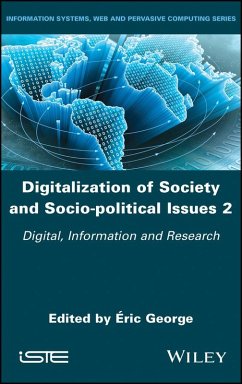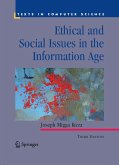Digitalization of Society and Socio-political Issues 2 (eBook, PDF)
Digital, Information, and Research
Redaktion: George, Eric


Alle Infos zum eBook verschenken

Digitalization of Society and Socio-political Issues 2 (eBook, PDF)
Digital, Information, and Research
Redaktion: George, Eric
- Format: PDF
- Merkliste
- Auf die Merkliste
- Bewerten Bewerten
- Teilen
- Produkt teilen
- Produkterinnerung
- Produkterinnerung

Hier können Sie sich einloggen

Bitte loggen Sie sich zunächst in Ihr Kundenkonto ein oder registrieren Sie sich bei bücher.de, um das eBook-Abo tolino select nutzen zu können.
Digitalization is a long socio-historic process in which all areas of society s activities are reconfigured. In the first volume of Digitalization of Society and Socio-political Issues, there is an examination of the transformations linked to the development of digital platforms and social media which affect cultural and communicational industries. The book also analyzes the formation of Big Data, their algorithmic processing and the societal changes which result from them (social monitoring and control in particular). Through diverse critical reflections, it equally presents different ways…mehr
- Geräte: PC
- mit Kopierschutz
- eBook Hilfe
- Größe: 9.15MB
![Digitalization of Society and Socio-political Issues 2 (eBook, ePUB) Digitalization of Society and Socio-political Issues 2 (eBook, ePUB)]() Digitalization of Society and Socio-political Issues 2 (eBook, ePUB)139,99 €
Digitalization of Society and Socio-political Issues 2 (eBook, ePUB)139,99 €![The Human Society and the Internet: Internet Related Socio-Economic Issues (eBook, PDF) The Human Society and the Internet: Internet Related Socio-Economic Issues (eBook, PDF)]() The Human Society and the Internet: Internet Related Socio-Economic Issues (eBook, PDF)40,95 €
The Human Society and the Internet: Internet Related Socio-Economic Issues (eBook, PDF)40,95 €![Ethical and Social Issues in the Information Age (eBook, PDF) Ethical and Social Issues in the Information Age (eBook, PDF)]() Joseph Migga KizzaEthical and Social Issues in the Information Age (eBook, PDF)40,95 €
Joseph Migga KizzaEthical and Social Issues in the Information Age (eBook, PDF)40,95 €![Ethical and Social Issues in the Information Age (eBook, PDF) Ethical and Social Issues in the Information Age (eBook, PDF)]() Joseph Migga KizzaEthical and Social Issues in the Information Age (eBook, PDF)44,95 €
Joseph Migga KizzaEthical and Social Issues in the Information Age (eBook, PDF)44,95 €![Ethical and Social Issues in the Information Age (eBook, PDF) Ethical and Social Issues in the Information Age (eBook, PDF)]() Joseph Migga KizzaEthical and Social Issues in the Information Age (eBook, PDF)38,95 €
Joseph Migga KizzaEthical and Social Issues in the Information Age (eBook, PDF)38,95 €![Electronic Communication Interception Technologies and Issues of Powers (eBook, PDF) Electronic Communication Interception Technologies and Issues of Powers (eBook, PDF)]() Daniel VentreElectronic Communication Interception Technologies and Issues of Powers (eBook, PDF)142,99 €
Daniel VentreElectronic Communication Interception Technologies and Issues of Powers (eBook, PDF)142,99 €- -23%11
![Information Technology for Management: Business and Social Issues (eBook, PDF) Information Technology for Management: Business and Social Issues (eBook, PDF)]() Information Technology for Management: Business and Social Issues (eBook, PDF)36,95 €
Information Technology for Management: Business and Social Issues (eBook, PDF)36,95 € -
-
-
Dieser Download kann aus rechtlichen Gründen nur mit Rechnungsadresse in A, B, BG, CY, CZ, D, DK, EW, E, FIN, F, GR, HR, H, IRL, I, LT, L, LR, M, NL, PL, P, R, S, SLO, SK ausgeliefert werden.
- Produktdetails
- Verlag: John Wiley & Sons
- Seitenzahl: 256
- Erscheinungstermin: 13. Januar 2020
- Englisch
- ISBN-13: 9781119694823
- Artikelnr.: 58582577
- Verlag: John Wiley & Sons
- Seitenzahl: 256
- Erscheinungstermin: 13. Januar 2020
- Englisch
- ISBN-13: 9781119694823
- Artikelnr.: 58582577
- Herstellerkennzeichnung Die Herstellerinformationen sind derzeit nicht verfügbar.
Éric GEORGE
Introduction xiii
Éric GEORGE
Part 1. The Digital and Information 1
Chapter 1. New News Formats on/by Digital Social Networks 3
Valérie CROISSANT and Annelise TOUBOUL
1.1. Framework for the exploratory analysis 4
1.2. Media temporalities 6
1.2.1. Signifying time 6
1.2.2. The media agenda 7
1.3. Media territories 10
1.3.1. Broadcasting tactics on Konbini 10
1.3.2. Tactics and dependencies for Brut and Le Monde 11
1.4. Conclusion 12
1.5. References 13
Chapter 2. New Information Practices and Audiences in the Digital Age 15
Pascal RICAUD
2.1. Understanding the reality of media change in a context of digital
transition 15
2.2. A new media contract 17
2.2.1. Redefining the problematic figure of an audience 18
2.2.2. What is the real place and involvement of the audience? 20
2.3. The new intermediate figures of information (the partition of
participation) 21
2.4. Conclusion 23
2.5. References 23
Chapter 3. The Effects of Innovation on the Careers of Journalists 27
Fábio Henrique PEREIRA
3.1. Theoretical framework 27
3.1.1. Profession and segments 27
3.1.2. A transnational identity for online journalists? 28
3.2. Methodology 30
3.3. Results 31
3.3.1. Ideological injunctions to innovation 31
3.3.2. Innovation discourses found in careers 34
3.3.3. An international circulation of discourses on innovation? 37
3.4. Conclusion 37
3.5. References 38
Chapter 4. Virtual Reality and Alternative Facts: The Subjective Realities
of Digital Communities 41
Louis-Philippe RONDEAU
4.1. Social media and alternative facts 41
4.2. VR: a surrogate reality 42
4.3. Convergence of social and virtual realities 45
4.4. Virtual reality as a vector of empathy 46
4.5. Conclusion 47
4.6. References 48
Chapter 5. Professional Structuring of Political Content Creators on
YouTube 51
Alexis CLOT
5.1. Being political on the Internet 53
5.1.1. Algorithms and buzz 53
5.1.2. Moderation and openness 53
5.1.3. To take on or not to take on politics 55
5.2. New grammars and old practices 56
5.2.1. Doing politics differently (Interview 7, 2018) 56
5.2.2. Journalists and videographers: "rival partners"? 57
5.3. Conclusion 59
5.4. References 59
Chapter 6. When Vlogging Educates in Politics: The French Case of "Osons
Causer" 61
Christelle COMBE
6.1. Theoretical anchoring 62
6.1.1. Computer-mediated multimodal communication and digital discourse
analysis 62
6.1.2. Multimodal interactive platforms and participatory culture 63
6.2. Purpose of the research and methodological approach 64
6.2.1. The vlog "Osons Causer" 64
6.2.2. The methodological approach 64
6.3. Analyses 65
6.3.1. Digital writing and building an ethos 65
6.3.2. Educating for politics: digital rhetoric and elements of didacticity
67
6.3.3. Relationality of native digital discourse 70
6.4. Conclusion 75
6.5. References 76
Part 2. Digital and Mobilizations 79
Chapter 7. El dia de la mùsica: The Digital Organization of the 2017
Catalan Referendum 81
Philippe-Antoine LUPIEN
7.1. Context: the organization of Catalan civil society 82
7.2. The alternative organization of the Catalan referendum 85
7.2.1. Broadcast: IPFS protocol to bypass censorship 86
7.2.2. Mobilization and tactical communication: Telegram Messenger,
official ANC channel 88
7.2.3. Voting: the "computer heroes" of October 1 89
7.3. Conclusion 91
7.4. References 92
Chapter 8. Digitalization and Civic Engagement for the Environment: New
Trends 93
Ghada TOUIR
8.1. Case study and methodology 95
8.2. Results and analyses 97
8.2.1. News/monitoring 98
8.2.2. Contact/networking 98
8.2.3. Mobilization/action 98
8.2.4. Sharing of know-how and knowledge 98
8.3. Conclusion 100
8.4. References 101
Chapter 9. Online Antifeminist Discourse and the Republican Left 103
Sklaerenn LE GALLO
9.1. Republican feminism, universalist feminism 104
9.1.1. Liberty, equality, fraternity 104
9.1.2. Thinking about secularism 105
9.1.3. A differentiated citizenship? 106
9.2. The case of Jean-Luc Mélenchon 108
9.2.1. On communitarianism 108
9.2.2. About Jeuxvideo.com's forum 18-25 109
9.3. Conclusion 110
9.4. References 111
Chapter 10. Digital Social Media and Access to Public Sphere 113
Raymond CORRIVEAU and France AUBIN
10.1. Research question 114
10.2. Public space and its challenges 114
10.3. Methodological design 115
10.4. Demonstration of evidence 116
10.5. Results 118
10.5.1. Visibility and consultation 119
10.5.2. The interaction 119
10.5.3. The follow-up 119
10.6. Reminder of the approach 120
10.7. Discussion 121
10.8. Conclusion 122
10.9. References 122
Chapter 11. Civil Society and Online Exchanges: Some Digital Contingencies
123
Martin BONNARD
11.1. Materialistic approach and transindividual communication milieu 123
11.2. Apparatuses and mediation through technology 124
11.3. Three digital contingencies 126
11.4. Conclusion 128
11.5. References 129
Part 3. Digital: Some Major Issues to Conclude 133
Chapter 12. Transparency, the Public's Right to Information versus Security
and State Secrecy in the Digital Age 135
Ndiaga LOUM
12.1. Relationships of power and domination between fields: research
questions 137
12.2. Illustrative case studies of power relationships 139
12.2.1. The sponsorship scandal: a Canadian case study 139
12.2.2. The unique and specific case of WikiLeaks: freedom of information
versus the need for state security 143
12.3. Conclusion 145
12.4. References 146
Chapter 13. Information Commons and the Neoliberal State 149
Lisiane LOMAZZI
13.1. The history and evolution of the commons 150
13.1.1. Legal and economic concepts of common goods 150
13.1.2. Political economy of the commons: the commons as institutional
arrangements 151
13.1.3. The socio-politics of the common: the common as a political
principle 152
13.2. The relationship between the commons and the neoliberal state 153
13.2.1. Article 8 of the Digital Republic Bill 153
13.2.2. The European Digital Summit 154
13.3. Conclusion 156
13.4. References 157
Chapter 14. Digitalization of Society: Elements for an Ecology of
Solicitation? 159
Dominique CARRÉ
14.1. Social computerization, digitalization of society: two different
processes or a new step in the same rationalization process? 160
14.2. Relevance of communication studies to understand the process of
social computerization (digitalization) 160
14.3. Outline of a new research orientation: moving towards an ecology of
solicitation? 162
14.4. Which approach should be adopted? 164
14.5. Conclusion 165
14.6. References 165
Chapter 15. What is the Concept of Humanities in Francophone Digital
Humanities? 169
Christophe MAGIS
15.1. The emergence of Francophone digital humanities 169
15.2. Digital humanities in the changing world of universities and HSS 171
15.3. Towards a critical theory of the humanities in the digital age:
experience, interpretation and speculative thinking 174
15.4. Conclusion 178
15.5. References 178
Chapter 16. The Digital Humanities as a Sign of Their Time 181
Luiz C. MARTINO
16.1. Breaking down the barriers between digital humanities 183
16.2. Actuality 184
16.3. Theory and practices 186
16.4. Conclusion 189
16.5. References 190
Conclusion 193
Michel SÉNÉCAL
List of Authors 205
Index 207
Éric GEORGE
Introduction xiii
Éric GEORGE
Part 1. The Digital and Information 1
Chapter 1. New News Formats on/by Digital Social Networks 3
Valérie CROISSANT and Annelise TOUBOUL
1.1. Framework for the exploratory analysis 4
1.2. Media temporalities 6
1.2.1. Signifying time 6
1.2.2. The media agenda 7
1.3. Media territories 10
1.3.1. Broadcasting tactics on Konbini 10
1.3.2. Tactics and dependencies for Brut and Le Monde 11
1.4. Conclusion 12
1.5. References 13
Chapter 2. New Information Practices and Audiences in the Digital Age 15
Pascal RICAUD
2.1. Understanding the reality of media change in a context of digital
transition 15
2.2. A new media contract 17
2.2.1. Redefining the problematic figure of an audience 18
2.2.2. What is the real place and involvement of the audience? 20
2.3. The new intermediate figures of information (the partition of
participation) 21
2.4. Conclusion 23
2.5. References 23
Chapter 3. The Effects of Innovation on the Careers of Journalists 27
Fábio Henrique PEREIRA
3.1. Theoretical framework 27
3.1.1. Profession and segments 27
3.1.2. A transnational identity for online journalists? 28
3.2. Methodology 30
3.3. Results 31
3.3.1. Ideological injunctions to innovation 31
3.3.2. Innovation discourses found in careers 34
3.3.3. An international circulation of discourses on innovation? 37
3.4. Conclusion 37
3.5. References 38
Chapter 4. Virtual Reality and Alternative Facts: The Subjective Realities
of Digital Communities 41
Louis-Philippe RONDEAU
4.1. Social media and alternative facts 41
4.2. VR: a surrogate reality 42
4.3. Convergence of social and virtual realities 45
4.4. Virtual reality as a vector of empathy 46
4.5. Conclusion 47
4.6. References 48
Chapter 5. Professional Structuring of Political Content Creators on
YouTube 51
Alexis CLOT
5.1. Being political on the Internet 53
5.1.1. Algorithms and buzz 53
5.1.2. Moderation and openness 53
5.1.3. To take on or not to take on politics 55
5.2. New grammars and old practices 56
5.2.1. Doing politics differently (Interview 7, 2018) 56
5.2.2. Journalists and videographers: "rival partners"? 57
5.3. Conclusion 59
5.4. References 59
Chapter 6. When Vlogging Educates in Politics: The French Case of "Osons
Causer" 61
Christelle COMBE
6.1. Theoretical anchoring 62
6.1.1. Computer-mediated multimodal communication and digital discourse
analysis 62
6.1.2. Multimodal interactive platforms and participatory culture 63
6.2. Purpose of the research and methodological approach 64
6.2.1. The vlog "Osons Causer" 64
6.2.2. The methodological approach 64
6.3. Analyses 65
6.3.1. Digital writing and building an ethos 65
6.3.2. Educating for politics: digital rhetoric and elements of didacticity
67
6.3.3. Relationality of native digital discourse 70
6.4. Conclusion 75
6.5. References 76
Part 2. Digital and Mobilizations 79
Chapter 7. El dia de la mùsica: The Digital Organization of the 2017
Catalan Referendum 81
Philippe-Antoine LUPIEN
7.1. Context: the organization of Catalan civil society 82
7.2. The alternative organization of the Catalan referendum 85
7.2.1. Broadcast: IPFS protocol to bypass censorship 86
7.2.2. Mobilization and tactical communication: Telegram Messenger,
official ANC channel 88
7.2.3. Voting: the "computer heroes" of October 1 89
7.3. Conclusion 91
7.4. References 92
Chapter 8. Digitalization and Civic Engagement for the Environment: New
Trends 93
Ghada TOUIR
8.1. Case study and methodology 95
8.2. Results and analyses 97
8.2.1. News/monitoring 98
8.2.2. Contact/networking 98
8.2.3. Mobilization/action 98
8.2.4. Sharing of know-how and knowledge 98
8.3. Conclusion 100
8.4. References 101
Chapter 9. Online Antifeminist Discourse and the Republican Left 103
Sklaerenn LE GALLO
9.1. Republican feminism, universalist feminism 104
9.1.1. Liberty, equality, fraternity 104
9.1.2. Thinking about secularism 105
9.1.3. A differentiated citizenship? 106
9.2. The case of Jean-Luc Mélenchon 108
9.2.1. On communitarianism 108
9.2.2. About Jeuxvideo.com's forum 18-25 109
9.3. Conclusion 110
9.4. References 111
Chapter 10. Digital Social Media and Access to Public Sphere 113
Raymond CORRIVEAU and France AUBIN
10.1. Research question 114
10.2. Public space and its challenges 114
10.3. Methodological design 115
10.4. Demonstration of evidence 116
10.5. Results 118
10.5.1. Visibility and consultation 119
10.5.2. The interaction 119
10.5.3. The follow-up 119
10.6. Reminder of the approach 120
10.7. Discussion 121
10.8. Conclusion 122
10.9. References 122
Chapter 11. Civil Society and Online Exchanges: Some Digital Contingencies
123
Martin BONNARD
11.1. Materialistic approach and transindividual communication milieu 123
11.2. Apparatuses and mediation through technology 124
11.3. Three digital contingencies 126
11.4. Conclusion 128
11.5. References 129
Part 3. Digital: Some Major Issues to Conclude 133
Chapter 12. Transparency, the Public's Right to Information versus Security
and State Secrecy in the Digital Age 135
Ndiaga LOUM
12.1. Relationships of power and domination between fields: research
questions 137
12.2. Illustrative case studies of power relationships 139
12.2.1. The sponsorship scandal: a Canadian case study 139
12.2.2. The unique and specific case of WikiLeaks: freedom of information
versus the need for state security 143
12.3. Conclusion 145
12.4. References 146
Chapter 13. Information Commons and the Neoliberal State 149
Lisiane LOMAZZI
13.1. The history and evolution of the commons 150
13.1.1. Legal and economic concepts of common goods 150
13.1.2. Political economy of the commons: the commons as institutional
arrangements 151
13.1.3. The socio-politics of the common: the common as a political
principle 152
13.2. The relationship between the commons and the neoliberal state 153
13.2.1. Article 8 of the Digital Republic Bill 153
13.2.2. The European Digital Summit 154
13.3. Conclusion 156
13.4. References 157
Chapter 14. Digitalization of Society: Elements for an Ecology of
Solicitation? 159
Dominique CARRÉ
14.1. Social computerization, digitalization of society: two different
processes or a new step in the same rationalization process? 160
14.2. Relevance of communication studies to understand the process of
social computerization (digitalization) 160
14.3. Outline of a new research orientation: moving towards an ecology of
solicitation? 162
14.4. Which approach should be adopted? 164
14.5. Conclusion 165
14.6. References 165
Chapter 15. What is the Concept of Humanities in Francophone Digital
Humanities? 169
Christophe MAGIS
15.1. The emergence of Francophone digital humanities 169
15.2. Digital humanities in the changing world of universities and HSS 171
15.3. Towards a critical theory of the humanities in the digital age:
experience, interpretation and speculative thinking 174
15.4. Conclusion 178
15.5. References 178
Chapter 16. The Digital Humanities as a Sign of Their Time 181
Luiz C. MARTINO
16.1. Breaking down the barriers between digital humanities 183
16.2. Actuality 184
16.3. Theory and practices 186
16.4. Conclusion 189
16.5. References 190
Conclusion 193
Michel SÉNÉCAL
List of Authors 205
Index 207







